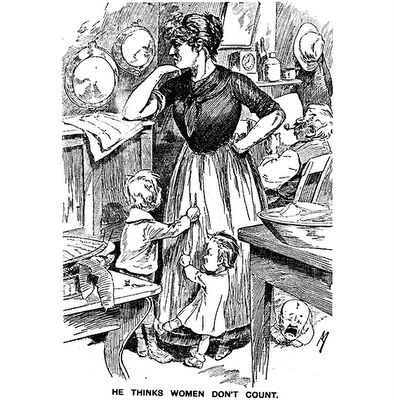
As the maid, Hannah, says in Louisa May Alcott's Little Women (published in 1868). The illustration above is from the same era, from a magazine published in Melbourne, Australia - a bit of satire on the reformers' push for an eight hour work day.
Interestingly, Alcott's friend and neighbor, Ralph Waldo Emerson had this to say in 1870:
Housekeeping is not beautiful; it cheers and raises neither the husband, the wife, nor the child; neither the host nor the guest; it oppresses women. A house kept to the end of prudence is laborious without joy; a house kept to the end of display is impossible to all but a few women, and their success is dearly bought.An alternate title for this blog post could be "A Primer on Housework". My musings on this were prompted by a number of things - reading Hirshman's articles (not so much her book) and many thoughtful blog responses to the articles; reading Darla Shine's Happy Housewives and Caitlin Flanagan's To Hell with All That, and a bunch of research on 19th century housewives and prescriptive (or advice) literature that I did for a part-time job.
I am actually grateful that Linda Hirshman brought up housework again. Feminists seem to address it periodically, then forget about it until the next time a discussion of family responsibilities (especially child care) and the consequences of having a parent working full-time for household work comes up again. Arlie Russell Hochschild brought it to widespread (but not sustained) public attention in 1989, with the publication of The Second Shift, but in case you'd like to read more, check this other stuff out.
The following three fascinating blog discussions were prompted by Hirshman's "Homeward Bound" in the American Prospect (republished by AlterNet) last fall & winter, especially by Hirshman's discussion of the "domestic glass ceiling":
The Happy Feminist, On Valuing Housework
Be a Bitch about Housework - see many comments, by Bitch Ph.D.
The Domestic Glass Ceiling, by Half Changed World
____________________
Now going back in time, from before The Second Shift:
Life Sentence: The Politics of Housework, by Debbie Taylor, from a 1988 issue of The New Internationalist devoted to housework.
Ann Oakley's books on housework and housewives, published in 1974. Her website doesn't provide page links - go to Publications, then Non-fiction, and then you can click on extracts from Housewife and The Sociology of Housework.
The Politics of Housework, by Pat Mainardi, 1970 - classic feminist essay. And funny. Very funny.
Housework in Late 19th Century America, by Steven Mintz and the complementary More Work for Mother, by Ruth Schwartz Cowan
Although I enjoy living in clean, well-appointed surroundings, I like writing, reading, and even mowing the lawn (with our reel mower, no less!) a lot better. We don't live in squalor, and luckily I have a high tolerance for clutter and dog hair, and little interest in what anyone outside my family thinks about this. Interestingly, I don't mind cleaning other people's stuff nearly as much as our own -- I greatly enjoyed and recommend Other People's Dirt: A Housecleaner's Adventures from Cape Cod to Kyoto, by Louise Rafkin for a fun read on zen & housekeeping, what your house tells your cleaning service about your lifestyle and personality, and some of the bizarre standards some women feel compelled to uphold.
Tags:
4 comments:
Just wanted to tell you I followed all your links, fascinating stuff.
"The measure of his resistance is the measure of your oppression." Yikes. That's harsh.
I absolutely love this subject--weirdly, both doing it (mostly), the politics of it, and the intellectual analysis of it. When you think about it, cleanliness and order are two things rich people take for granted; as long as you have that in your life, you are, in some sense, rich. So housework, in my view, adds immeasurably to the wealth of nations, even if nobody in this country wants to give it a dollar value.
Tracy, you would probably enjoy that Rafkin book a lot. It is incredibly entertaining.
Anyone remember which David Sedaris book has the nude housecleaning essay in it?
Also - don't know what happened, but I fixed the link to the old issue of "The New Internationalist". It has a lot of other good articles in addition to Debbie Taylor's cover story, including one called "Wages for Housework", where Zoë Fairbairns "wonders why feminists would rather pay a cleaner than insist that men help with the housework". Though my answer to that is the obvious "it's easier".
And really, Crystal Eastman's (1920!) "Now We Can Begin" essay belongs right up there with Mainardi's 1970 piece: Excerpts on Housework from Now We Can Begin
Post a Comment